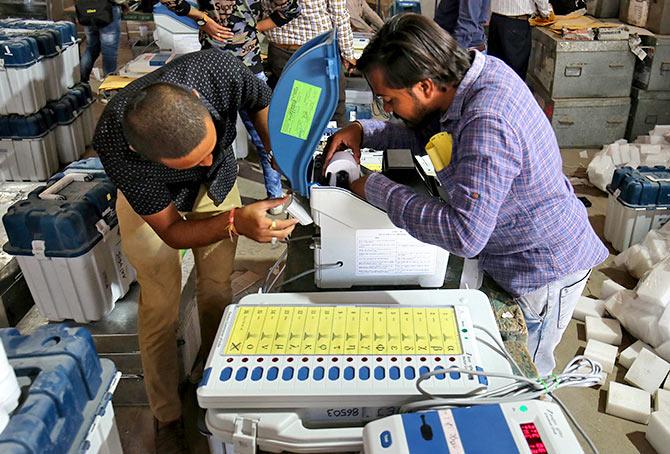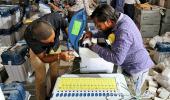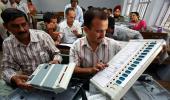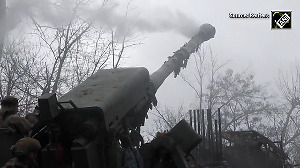The Supreme Court on Tuesday deprecated criticism of electronic voting machines (EVMs) and calls for reverting to ballot papers, saying the electoral process in India is a "humongous task" and attempts should not be made to "bring down the system".

It also recalled how polling booths were captured in the era of ballot papers to manipulate election results.
The top court was hearing a batch of pleas seeking complete cross-verification of the votes cast using EVMs with Voter Verifiable Paper Audit Trail (VVPAT), an independent vote verification system which enables an elector to see whether his vote was cast correctly.
A bench of Justices Sanjiv Khanna and Dipankar Datta was critical of the argument that many European countries have gone back to ballot papers after having tried out voting machines.
"This is a humongous task. No European country can do this. You talked about Germany but what is the population there? My home state West Bengal is far more populous than Germany. We have to repose faith and trust in the electoral process. Don't try to bring down the system like this," Justice Datta told advocate Prashant Bhushan, appearing for NGO Association for Democratic Reforms.
Bhushan had pitched for a return to ballot papers while citing the German example.
The bench said there were roughly 98 crore registered voters in India. "There will be some mismatch in vote count due to some human errors but it can be countered and checked," it said.
Justice Khanna, while referring to booth capturing in the past, said, "Mr. Bhushan, we are all in our 60s. We have seen what used to happen earlier when there were no EVMs. We don't need to tell you."
Maintaining that he is not casting any aspersion on the Election Commission or saying that EVMs have been manipulated, Bhushan said his only point is that these polling machines can be tinkered with.
Normally, human intervention in a process creates problems including bias, while machines, without any wrong human intervention, work properly and give accurate results, Justice Khanna told Bhushan.
The bench posed a barrage of questions to the Election Commission officials present in the court about the functioning of EVMs, their storage and the possibility of data manipulation.
"We want you to apprise us of each and every detail from point A to Z on the EVMs, right from their assembling to storage after the counting of votes," the bench told senior advocate Maninder Singh, appearing for the Election Commission.
Bhushan said he also wants that every voter should be allowed to collect the paper slip of his vote cast from the VVPAT machine and drop it into the ballot box. He also sought reversal of the poll panel's decision to replace the transparent glass on VVPAT machines with an opaque glass through which a voter can see the slip only when the light is on for seven seconds.
He alleged that two public sector undertakings -- Bharat Electronic Ltd and Electronics Corporation of India Ltd (ECILL) -- have as its directors people who are associated with ruling Bharatiya Janata Party.
The bench asked Singh whether it is possible to subject EVMs to technical evaluation to rule out any foul play after the counting of votes is over.
Singh urged the court to not indicate any such thing without hearing the poll panel on the issue as it would create unnecessary confusion.
"Don't be apprehensive. We are not indicating any such thing but are only soliciting a response," Justice Khanna told Singh.
The bench also asked the poll panel to apprise it about the punishment prescribed under the law for someone who manipulates EVMs.
"If some manipulation is done, then what is the consequence? What is the punishment prescribed under the law? Tell us. This is a very serious thing because there should be some fear of the consequences," the court told Singh.
Senior advocate Gopal Sankaranarayanan, appearing for activist Arun Kumar Agrawal, who has sought a complete count of VVPAT slips in polls, submitted there should not be even an iota of doubt about the electoral process and the Election Commission should ensure that.
He claimed after the 2019 Lok Sabha elections, a parliamentary committee had found discrepancies in EVM data but the Election Commission never responded to the panel.
"There are very high chances of error. We always blame the population for everything including the number of cases clogging our judicial system. We should focus on the system so that there is no iota of doubt in the mind of even a single voter," he said.
During the nearly two-hour-long hearing, several advocates appearing for different petitioners addressed the court, with some suggesting use of bar codes to reduce chances of manipulation of EVMs. One of them claimed conflict of interest on the part of members of the technical committee of the Election Commission, saying they were the inventors and designers of the EVMs.
The hearing remained inconclusive and would resume on April 18.
The seven-phase Lok Sabha polls will begin on April 19.
The ADR has sought matching the count in EVMs with votes that have been verifiably "recorded as cast" and to ensure that the voter is able to verify through VVPAT slip that his vote, as recorded on the paper slip, has been "counted as recorded".











 © 2025
© 2025